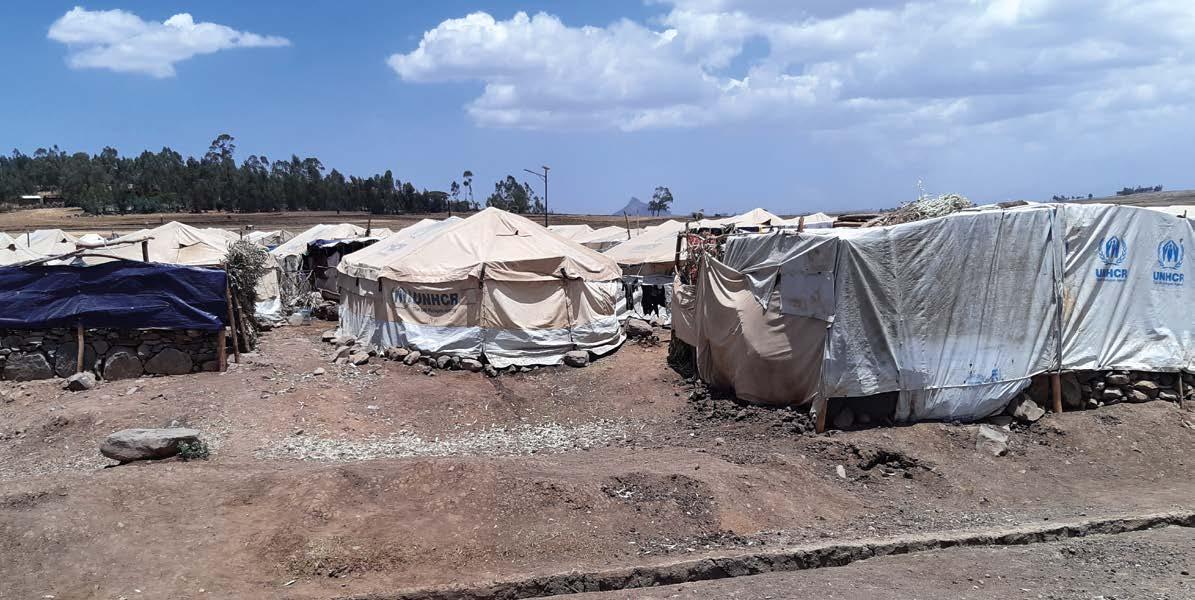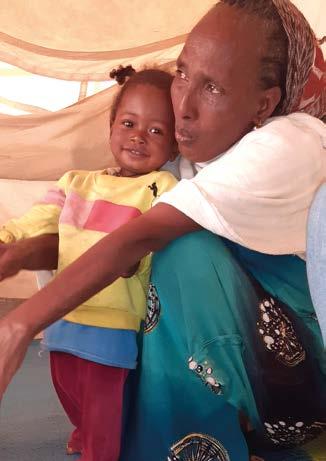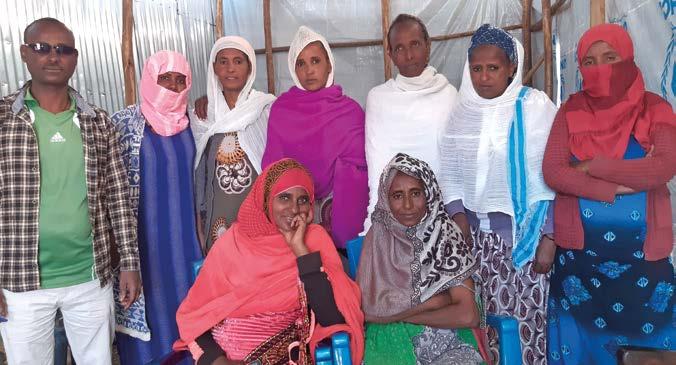
5 minute read
MAKING A DIFFERENCE – or not?
On a recent visit to northern Ethiopia, Jesuit Missions’ Director Paul Chitnis heard the challenges levelled by displaced people at an indifferent world in a new and powerfully affecting way.
The provincial town of Dabat in northern Ethiopia is now home to some 24,000 refugees displaced by a conflict which started in November 2020 in the nearby province of Tigray. They are a fraction of the 28 million people in need across the country. I am visiting Alem-Wach refugee camp with Jesuit Missions’ partner, JRS International. Despite my thirty years in international development, I am shocked by what I find.
Advertisement
We drive up a dusty track past women carrying jerry cans of water and donkeys laden with sacks of grain. At the summit, a vast city of tents opens up before us. Crowds of refugees are queuing for food and medical attention. Another group is gathered around a figure in military fatigues who is gesticulating imperiously.
I speak with a group of women. We sit inside a shack hidden from the other refugees to safeguard their identity and afford them the freedom to speak freely.
As I have done in refugee camps around the world for decades, I sit with my notebook listening intently to the women as their words are translated. Of course, nothing can really translate their brutal experiences into words. One of the younger women, Feven, swathed in a vibrant red headscarf, her eyes blazing with anger, speaks: ‘This is not the first time someone has interviewed us, written down our answers, visited our tents and offered their sympathy. And what difference does it make?’
What have I done for Christ?
What am I doing?
What will I do?
As I hear this, the pen falls from my hand and tears well in my eyes. This woman has spoken from the depths of her being to the depths of mine. In that moment, it is not just me she addresses but the rest of an indifferent world. They know how the world has responded to war in Ukraine, the welcome given to refugees, the mobilisation of immense resources to support an embattled people. How different it is from their experience!
I thank Feven for her courage and candour. She smiles gently and, in that moment, I know she is not condemning me. But she is right and I determine to tell their story.
Their food rations have been cut because the UN appeal for Ethiopia is 79% under-funded. The children are sick with no medicines to care for them. They are cold at night and have no blankets. They cannot work or travel because their ID cards have been invalidated.

Unsurprisingly the young men lose hope and turn to drugs and alcohol. Many flee through Sudan to Libya and thence to Europe, some ending up on the beaches of Kent.
We walk along the dusty track, over the open sewer and between the tightly crowded tents to visit the one that belongs to Bisrat.
Sitting on the floor is her daughter, Hanna, a young woman in her twenties. Her hollow eyes stare blankly at me as I enter. She is painfully thin. Her mother explains that, on their eight-day flight from Tigray, Hanna had a miscarriage. Hanna gazes into the middle distance, lost in her thoughts. Bisrat introduces Robel, her six-year-old grandson. He is traumatised when he sees soldiers because of what he has witnessed. I remember the imperious soldier at the entrance of the camp.

As we become easier in each other’s company, Hanna starts to talk. 115 people started with her but they were divided by the smugglers, then threatened by armed men. Hanna and a fourteen-year-old girl were separated from the others, taken into a forest and raped repeatedly.
Bisrat is in tears as she listens. Hanna explains that she is now stigmatised by the rest of the community. I understand now why she sits inside the tent, invisible and unseen. So painful are the memories and so shameful the stigma that Hanna has attempted suicide. Bisrat shows us the antidepressants her daughter is taking.
We leave Bisrat’s tent as silently as we leave church on Good Friday. At lunch, we ponder what we have heard. These experiences are neither new nor unusual. I recall the boldness of Feven, shrouded in her red scarf, challenging us about what will change as a result of our visit. It is a question that goes to the core of our faith.
In his Spiritual Exercises, St Ignatius invites us to gaze at Jesus on the cross and ponder: what have I done for Christ? What am I doing? What will I do?
This Easter, I could not see Jesus on the cross – only the faces of Hanna, Feven and Bisrat.
Help us to keep sharing these stories FREE OF CHARGE!
If you are able to support the costs of printing and posting Jesuits & Friends, please visit jesuitmissions.org.uk/take-action/makedonation/ where you can either make a one-off gift or a regular donation; or send a cheque payable to ‘Jesuit Missions’ to Jesuit Missions, 11 Edge Hill, London SW19 4LR (or in the enclosed Freepost envelope, if you are an individual subscriber in the UK). Please write on the reverse of the cheque: ‘Jesuits & Friends printing donation’.
Your generosity will help us to keep the magazine free of charge and means that we can continue to share stories like those of Hanna, Feven and Bisrat with even more people. Thank you.








